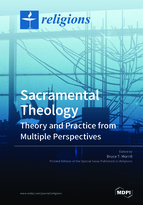Sacramental Theology: Theory and Practice from Multiple Perspectives
A special issue of Religions (ISSN 2077-1444).
Deadline for manuscript submissions: closed (1 August 2019) | Viewed by 54353
Special Issue Editor
Special Issue Information
In the second half of the twentieth century, sacrament emerged as a vital topic within the ressourcement movements of Western European Catholic theology. Scholarship attentive to multiple sources in early Christianity—philosophical, homiletic, liturgical, pastoral—rescued sacramental symbol and ritual from merely being the object of clerical ministration, passive lay reception, and canonical regulation to becoming a key to understanding divine-human encounter in the mission of the church and the lives of its members. Recovering the ancient, as well as best of medieval, theology of sacramental rites as sacred mysteries, European and North American theologians enlisted contemporary phenomenological and hermeneutical philosophies to explain and promote sacraments not as clerically delivered objects but, rather, as profound human symbolic events of divine revelation. By the turn of the twenty-first century the need for attention to the actual performance of specific rites (and thus, the need for historical, social-scientific, and other human disciplines in addition to philosophy) had become well established. This now makes the work of sacramental theology an ongoing attention to multi-or-cross-disciplinary theories attentive to actual contexts (historical and contemporary) of sacramental-liturgical practices. Insofar as Christian sacraments only exist in symbolic-ritual performances, the field of liturgical studies (itself multidisciplinary, including ritual and performance theories) has proven increasingly integral to sacramental-theological work. Attention to historical and actual practices of Christian symbol and ritual (liturgy and sacraments) nonetheless returns continuously to philosophical-theological theories that meet the intellectual need to reflect upon divine presence and absence, personal and communal experiences of God, of Christ, of the Spirit, scripture and tradition, the ecclesial or communal dimension of sacramental celebrations, types of power at work in the rites, liturgical participation, etc. Thus, sacramental theology proves expansive in the range of Christian existence it addresses, even as the bodily nature of the subject matter requires constant theoretical reconsiderations attentive to historical, social, and cultural contexts.
Dear Colleagues,
From the second half of the twentieth century sacramental theology has continued to evolve as a discipline advancing both comprehensive theories (theologies) of sacraments and sacramentality as integral to the nature and practice of Christianity and studies of particular rites in their historical, social, cultural, and embodied contexts. By the turn of the twenty-first century the need for attention to the actual performance of specific rites (and thus, the need for historical, social-scientific, and other human disciplines in addition to philosophy) had become well established. This now makes the work of sacramental theology an ongoing attention to multi-or-cross-disciplinary theories attentive to actual contexts (historical and contemporary) of sacramental-liturgical practices. Insofar as Christian sacraments only exist in symbolic-ritual performances, the field of liturgical studies (itself multidisciplinary, including ritual and performance theories) has proven increasingly integral to sacramental-theological work. Attention to historical and actual practices of Christian symbol and ritual (liturgy and sacraments) nonetheless returns continuously to philosophical-theological theories that meet the intellectual need to reflect upon the divine-human encounter both within ecclesial rites themselves and across the range of bodily (physical, cultural, traditional) ways Christians practice their faith in the world. This special issue of Religions invites scholars to contribute further to the sacramental theology by any of the above, ever-evolving, disciplinary approaches (or combinations thereof). Articles may address the concept of sacrament comprehensively or through focus on particular rites (in historical or contemporary contexts, or combinations thereof).
Prof. Dr. Bruce Morrill
Guest Editor
Manuscript Submission Information
Manuscripts should be submitted online at www.mdpi.com by registering and logging in to this website. Once you are registered, click here to go to the submission form. Manuscripts can be submitted until the deadline. All submissions that pass pre-check are peer-reviewed. Accepted papers will be published continuously in the journal (as soon as accepted) and will be listed together on the special issue website. Research articles, review articles as well as short communications are invited. For planned papers, a title and short abstract (about 100 words) can be sent to the Editorial Office for announcement on this website.
Submitted manuscripts should not have been published previously, nor be under consideration for publication elsewhere (except conference proceedings papers). All manuscripts are thoroughly refereed through a double-blind peer-review process. A guide for authors and other relevant information for submission of manuscripts is available on the Instructions for Authors page. Religions is an international peer-reviewed open access monthly journal published by MDPI.
Please visit the Instructions for Authors page before submitting a manuscript. The Article Processing Charge (APC) for publication in this open access journal is 1800 CHF (Swiss Francs). Submitted papers should be well formatted and use good English. Authors may use MDPI's English editing service prior to publication or during author revisions.
Keywords
- sacraments
- sacramentality
- liturgy
- phenomenology
- symbols
- ritual
- Christianity
Benefits of Publishing in a Special Issue
- Ease of navigation: Grouping papers by topic helps scholars navigate broad scope journals more efficiently.
- Greater discoverability: Special Issues support the reach and impact of scientific research. Articles in Special Issues are more discoverable and cited more frequently.
- Expansion of research network: Special Issues facilitate connections among authors, fostering scientific collaborations.
- External promotion: Articles in Special Issues are often promoted through the journal's social media, increasing their visibility.
- Reprint: MDPI Books provides the opportunity to republish successful Special Issues in book format, both online and in print.
Further information on MDPI's Special Issue policies can be found here.






